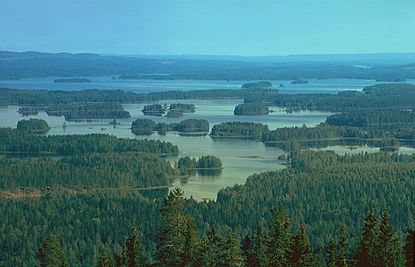Portal:Ecology
| |
|
|
Ecology
|
|
Ecology (from Ancient Greek οἶκος (oîkos) 'house', and -λογία (-logía) 'study of') is the natural science of the relationships among living organisms, including humans, and their physical environment. Ecology considers organisms at the individual, population, community, ecosystem, and biosphere levels. Ecology overlaps with the closely related sciences of biogeography, evolutionary biology, genetics, ethology, and natural history. Ecology is a branch of biology, and is the study of abundance, biomass, and distribution of organisms in the context of the environment. It encompasses life processes, interactions, and adaptations; movement of materials and energy through living communities; successional development of ecosystems; cooperation, competition, and predation within and between species; and patterns of biodiversity and its effect on ecosystem processes. Ecology has practical applications in conservation biology, wetland management, natural resource management (agroecology, agriculture, forestry, agroforestry, fisheries, mining, tourism), urban planning (urban ecology), community health, economics, basic and applied science, and human social interaction (human ecology). The word ecology (German: Ökologie) was coined in 1866 by the German scientist Ernst Haeckel. The science of ecology as we know it today began with a group of American botanists in the 1890s. Evolutionary concepts relating to adaptation and natural selection are cornerstones of modern ecological theory. Ecosystems are dynamically interacting systems of organisms, the communities they make up, and the non-living (abiotic) components of their environment. Ecosystem processes, such as primary production, nutrient cycling, and niche construction, regulate the flux of energy and matter through an environment. Ecosystems have biophysical feedback mechanisms that moderate processes acting on living (biotic) and abiotic components of the planet. Ecosystems sustain life-supporting functions and provide ecosystem services like biomass production (food, fuel, fiber, and medicine), the regulation of climate, global biogeochemical cycles, water filtration, soil formation, erosion control, flood protection, and many other natural features of scientific, historical, economic, or intrinsic value. (Full article...) Selected article -The Ecology of the North Cascades is heavily influenced by the high elevation and rain shadow effects of the mountain range. The North Cascades is a section of the Cascade Range from the South Fork of the Snoqualmie River in Washington, United States, to the confluence of the Thompson and Fraser Rivers in British Columbia, Canada, where the range is officially called the Cascade Mountains but is usually referred to as the Canadian Cascades. The North Cascades Ecoregion is a Level III ecoregion in the Commission for Environmental Cooperation's classification system. The terrain of the North Cascades is composed of high, rugged mountains. It contains the greatest concentration of active alpine glaciers in the conterminous United States and has a variety of climatic zones. A dry continental climate occurs in the east and mild, maritime, rainforest conditions are found in the west. It is underlain by sedimentary and metamorphic rock in contrast to the adjoining Cascades which are composed of volcanics. (Full article...)Selected image - Credit: Paul Lenz General imagesThe following are images from various ecology-related articles on Wikipedia.
Related WikiProjectsThings you can do
Entries here consist of Good and Featured articles, which meet a core set of high editorial standards.
 An apex predator, also known as a top predator, is a predator at the top of a food chain, without natural predators of its own. Apex predators are usually defined in terms of trophic dynamics, meaning that they occupy the highest trophic levels. Food chains are often far shorter on land, usually limited to being secondary consumers – for example, wolves prey mostly upon large herbivores (primary consumers), which eat plants (primary producers). The apex predator concept is applied in wildlife management, conservation, and ecotourism. (Full article...)Selected biography -
Eugene Pleasants Odum (September 17, 1913 – August 10, 2002) was an American biologist at the University of Georgia known for his pioneering work on ecosystem ecology. He and his brother Howard T. Odum wrote the popular ecology textbook, Fundamentals of Ecology (1953). The Odum School of Ecology is named in his honor. (Full article...)
Did you know (auto-generated)
Selected quote -
Ecology news
Additional News Highlights
Selected publication -The Journal of Applied Ecology is a peer-reviewed scientific journal publishing research in all areas of environmental management. It began publication in 1964 and is the third oldest journal of the British Ecological Society (after the Journal of Ecology and the Journal of Animal Ecology). It is available both in print and online. (Full article...) Related portalsMore did you know -Related articlesAssociated WikimediaThe following Wikimedia Foundation sister projects provide more on this subject:
Web resources
Discover Wikipedia using portals |
- ^ "Data Sources". Global Footprint Network. 2010-02-05. Retrieved 2010-02-05.















































